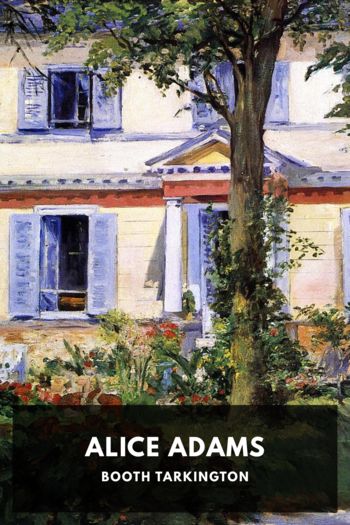National Avenue - Booth Tarkington (the little red hen ebook TXT) 📗

- Author: Booth Tarkington
Book online «National Avenue - Booth Tarkington (the little red hen ebook TXT) 📗». Author Booth Tarkington
“I suppose your mother had to give up getting you to wear an ulster this afternoon,” she said. “It might have hidden that wonderful frock coat.”
“You know as well as I do I never wear an overcoat unless it’s a lot colder than this,” he returned; and he added: “You’re a funny girl, Martha Shelby.”
“Why?”
“Well, don’t you consider you’re an old friend of mine? Anyway, I do, and here I haven’t seen you since way back last fall, and you haven’t said you’re glad I’m back, or anything! The truth is, I was kind of lookin’ forward to your sayin’ something like that.”
He spoke lightly, yet there was a hint of genuine grievance in his voice, and she was obviously pleased with it, for she gave him a quick side glance so fond it seemed almost a confession. But she laughed, perhaps to cover the confession, and said cheerfully: “There’s one thing neither college nor New York has changed about you, Dan. You’ll never learn to sound the final g in a participle; you’ll always say ‘lookin’ ’ and ‘sayin’ ’ and ‘goin’ ’ and ‘comin’.’ Doesn’t it worry Harlan?”
“Changin’ the subject, aren’t you?” he inquired. “Why didn’t you tell me you’re glad I’m back home again?”
“I am glad,” she said obediently. “Are you glad, yourself?”
“To see you? You know it.”
“No, I meant: Are you glad to be home?”
He looked thoughtful. “Well, I like New York; there isn’t any place else where you can see as much or do as much when you want to; it’s always a mighty fine show. And, besides, I like some people that live there.” He hesitated, continuing: “I—well, I do like some of the people in New York, but after all I’m glad to get home; I’m mighty glad.” Then he added, as a second thought: “In a way, that is.”
“In what way particularly, Dan?”
“Well, I do like some New York people,” he insisted, a little consciously;—“and I’m sorry to be away from them, but it’s pretty nice to get back here where you know ’most everybody you’re liable to meet. When you see a dog, for instance, you know who he belongs to and probably even his name—anyhow you probably do, if he belongs in your own part of town—and most likely the dog’ll know you, too, and stop and take some interest in you. Of course, I mean here you know everybody that is anybody;—naturally no one knows every soul in a town this big—and growin’ bigger every day.”
“Hurrah for you!” she cried, laughing at him again. “Why, you already talk like a member of the Chamber of Commerce, Dan.”
“How’s that?”
“Oh, you know the speeches they make: ‘A city of prosperity, a city of homes, a city that produces more wooden butter-dishes than all the rest of the country combined! Yes, ladies and gentlemen, the finest city with the biggest future in the whole extent of these United States!’ ”
Dan laughed, but there came into his eyes a glint of enthusiasm that was wholly serious. “Well, I believe they’re not so far wrong, at that. In some ways I think myself it is about the finest city in the country. It kind of came over me when I got off the train yesterday and drove up home through these broad old streets with the big trees and big houses. It’s when you’ve been away a good while that you find out how you appreciate it when you get back. Harlan’s just the other way; he says when he’s been away and gets back, the place looks squalid to him. ‘Squalid’ was what he said. He makes me tired!”
“Does he?”
“Yes; when he talks like that, he does,” Dan answered. “Why, the people you see on the streets here, they’ve all got time enough and interest enough in each other to stop and shake hands and ask about each other’s families, and they’re mighty nice, intelligent-looking people, too. In New York everybody hurries by; they don’t know each other anyway, of course; and if you get off Broadway and Fifth Avenue and Madison Avenue, and one or two other streets, you’re liable to see about as many foreigners as you will Americans; but here they’re pretty near all Americans. It’s kind of a satisfaction to see the good, old-fashioned faces people have in this city.”
“I like to hear you praising old-fashioned things,” Martha Shelby said slyly. “You must have something dreadfully important to say to your grandmother, Dan.”
“Why?”
“Well, don’t people put on their robes of state for tremendous occasions? Or did you just get so in the habit of it in New York that you can’t give it up?”
“Maybe that’s it,” he laughed. “But I expect it’ll wear off pretty soon if I stay here; and anyhow I am glad to get back. The fact is I’m a lot gladder than I expected to be. The minute I got off the train I had a kind of feeling—a pretty strong feeling—that this is where I honestly belong. It was home, and the people and the streets and the yards and trees and even the air—they all felt homelike to me. And when I went into our good old house—why, I felt as if I hadn’t been in a house, not a real house, all the time I was away. But most of all, it’s the people.”
“Your father and mother?”
“Yes,” he said;—“but I mean everybody else, too. I mean you can seem to breathe easier with ’em and let out





Comments (0)